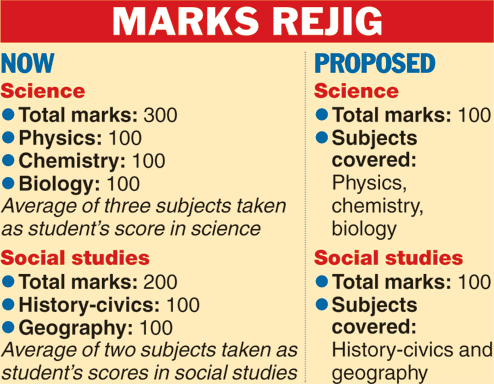
The Council for Indian School Certificate Examinations plans to shorten the science and social science papers in the ICSE course from 2018 to reduce the load on the students, a move that has run into criticism in the academic community.
In the proposed system, students will have to study only a single 100-mark paper in science covering physics, chemistry and biology, instead of three 100-mark papers.
The ICSE science syllabus is now of 300 marks - covering physics, chemistry and biology of 100 marks each. The average of the marks in the three papers is taken as the student's score in science.
Similarly, the council also plans to reduce the 200-mark history-civics and geography paper into a 100-mark one.
The revised syllabus is likely to be implemented in 2018. Students who will be promoted to Class IX in 2016 will be the first batch to write their ICSE under the new system.
Gerry Arathoon, the chief executive and secretary of the CISCE, said on Thursday the move was aimed at reducing the stress on the students and claimed that the shortening of the papers would not affect the standard of the course.
"We are yet to finalise the ways to merge the three papers in science and the two papers in social studies into single papers. The syllabuses would have to be trimmed, but proper care will be taken to ensure the course does not get diluted. Proper steps will be taken to maintain the present high standard of the ICSE course," Arathoon said.
But teachers of several ICSE schools expressed the fear that the move would affect the quality of the course.
Arathoon said one of the reasons behind the move was to establish parity between the ICSE syllabus and the Class X syllabus followed by the CBSE.
That is precisely what most teachers are opposed to. Bengal has the largest number of ICSE schools in the country - nearly 355 - and many parents prefer them to CBSE institutions because the ICSE course is believed to be more demanding.
"It is true that there are some dated topics in the current ICSE syllabus. But that is no reason why the three science papers of 100 marks each have to be condensed into a 100-mark one," a teacher said. "We have no problem if the council wants to revise the curriculum with a scientific approach. But it should not trim the syllabus to be on a par with the CBSE."
Another teacher questioned the council's intention of reducing the load on the students. "The success rate of ICSE is high. Also, the number of students scoring between 80 and 100 per cent in ICSE is higher than in other boards. These factors should be taken into consideration before finalising the decision," the teacher said.
Around 25 per cent of the students in ICSE score 90 per cent and above, against 10-15 per cent in CBSE. "Students do not seem overburdened. Why do we need to lessen the load?" the teacher wondered.
Some teachers said there is a wide gulf between the ICSE and ISC syllabi, particularly in science, and students who opt for science at the Plus-II level are often inconvenienced because of that. "The council should keep this in mind before trimming the syllabus," a physics teacher said.











